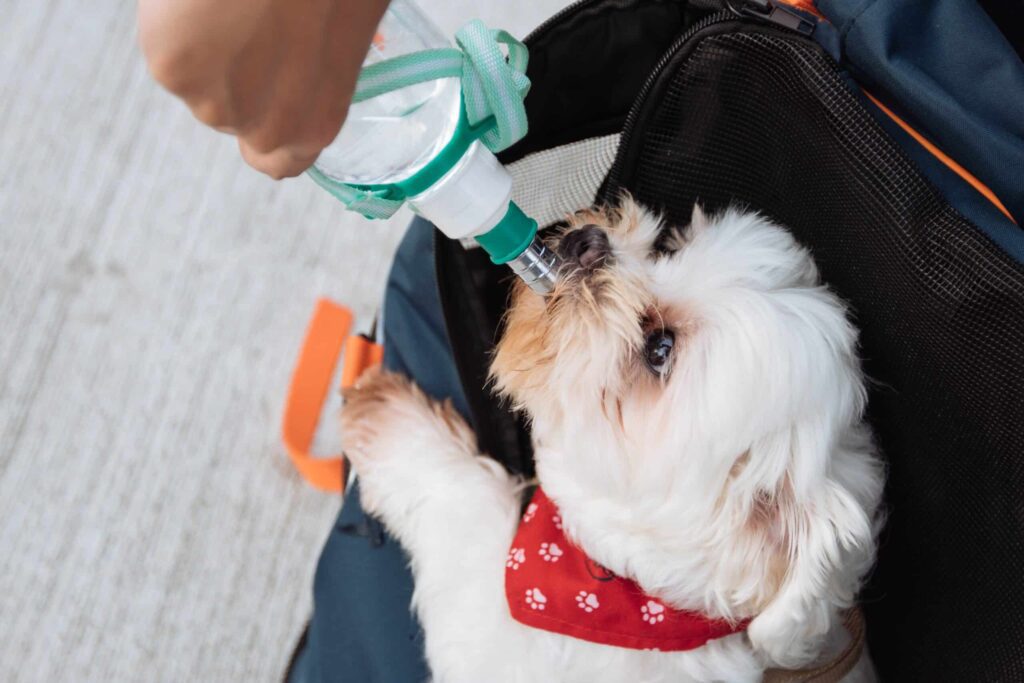When it comes to staying healthy and happy, water is just as vital for our furry friends as it is for us. Dehydration, or the lack of sufficient water in the body, can be a serious and life-threatening condition for dogs.
As a loving pet parent, it’s essential to know how to keep your dog properly hydrated and recognize the signs of dehydration. Let’s dive into everything you need to know about your dog and dehydration!

The Importance of Water for Your Dog’s Health
Just like us, dogs rely on water to cool their bodies, transport nutrients, and flush out toxins. Generally, a dog needs about one ounce of water per day for each pound of body weight. For example, a 20-pound dog would need around 20 ounces of water a day.
However, factors like the weather, activity level, and health conditions can increase your dog’s water needs. Did you know that water makes up almost 75% of a dog’s body weight? A loss of just 15% can be dangerous, so it’s crucial to keep an eye on your pup’s water intake.
Why Dogs Become Dehydrated
Dogs have a unique way of staying cool—they pant! With only sweat glands on their noses and foot pads, panting helps dogs release excess heat. But, panting also means losing moisture, and without enough water, your dog can become dehydrated. Common causes of dehydration in dogs include:
- Hot weather and lack of shade
- Not having access to fresh water
- Illnesses that cause vomiting or diarrhea
- Certain medications or health conditions
Symptoms of Dehydration
If you notice any of the following signs, your dog might be dehydrated:
- Lethargy or tiredness
- Loss of appetite
- Dry, sunken eyes
- Dry mouth and gums
- Increased heart rate
- Delayed capillary refill time (press your dog’s gums and see if the color returns quickly)
- Loss of skin elasticity (gently pinch your dog’s skin; it should bounce back right away)
What to Do If Your Dog Is Dehydrated
If your dog shows signs of dehydration, don’t panic! Here’s what you can do:
- Move your dog to a cool area to help them relax.
- Offer small sips of cool water every few minutes—don’t let them gulp down a lot at once.
- If your dog’s symptoms are severe, head to the vet right away. Dehydration can be serious and may need medical treatment like fluids given under the skin or intravenously.
What Not to Do
Avoid these common mistakes when dealing with a dehydrated dog:
- Don’t feed them dry food, as it can worsen dehydration.
- Don’t give large amounts of water all at once—it may cause vomiting.
- Avoid using ice packs, which can restrict blood flow and hinder cooling.
Dogs at Risk of Dehydration
Some dogs have a higher risk of dehydration, including senior dogs, puppies, pregnant or nursing dogs, dogs with dark or heavy coats, and dogs with illnesses like fever, diarrhea, or kidney disease.
Preventing Dehydration
Keeping your dog hydrated is easier than you think:
- Ensure your dog always has access to clean, fresh water.
- Keep outdoor dogs cool with plenty of shade and water bowls that won’t tip over.
- Bring water for your dog when traveling or exercising outside.
- If your dog refuses to drink, check their mouth and call your vet if needed.
- See a dog without water? Report it to authorities immediately.
Conclusion
Dehydration can pose a real threat to your dog’s health, but with your attention and care, you can keep your pup well-hydrated and feeling their best. Remember that access to fresh water and a cool environment are key to preventing dehydration, especially during hot weather or after exercise. Always keep an eye out for the symptoms of dehydration, and don’t hesitate to seek veterinary help if you suspect your dog is dehydrated. With your love and attention, your furry friend will thrive and enjoy many happy, hydrated days by your side!
Disclaimer
The information provided in this article is for educational purposes only and is not a substitute for professional veterinary advice. Always consult your veterinarian for any concerns about your dog’s health and hydration status.

Jay
Jay is a health and wellness enthusiast with expertise in water quality and nutrition. As a knowledgeable advocate for holistic well-being, Jay successfully manages Type 2 Diabetes through informed lifestyle choices. Committed to sharing reliable and authoritative insights, Jay combines firsthand experience with a passion for enhancing health."

